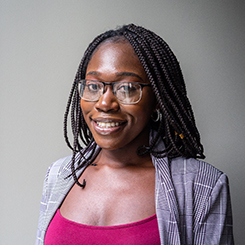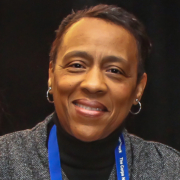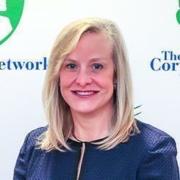

National Council of Young Leaders banner, painted by council member Francisco Garcia
Created in July 2012 in response to a recommendation from the White House Council on Community Solutions, the National Council of Young Leaders is tasked with informing policymakers, business leaders and funders about the issues faced by America’s young people. The 14 founding council members, ranging in age from 18 to 34, come from diverse upbringings in urban and rural low-income communities across the nation. They represent our country’s Opportunity Youth: the 6.7 million young Americans who are neither in school nor working, but who pose enormous potential for our economy and our future if they are provided the opportunity to get on track and get ahead. Though each council member has overcome different kinds of obstacles, they all share in common their participation in transformative youth programs that helped them become the successful young adults they are today.
In the fall of 2012, the Council released its first publication – Recommendations to Increase Opportunity and Decrease Poverty in America. The report outlines specific actions that could help Opportunity Youth and their communities. One of highlights of the publication is the Council’s Six Recommendations for Immediate Public Action: 1) Expand effective comprehensive programs; 2) Expand National Service; 3)Expand Private Internships; 4) Increase All Forms of Mentoring; 5) Protect and Expand Pathways to Higher Education; and 6) Reform the Criminal Justice System.
We wanted to hear the Council Members describe in their own words why these specific Recommendations are important to them and important to the success of America’s young people. Below, find out why council member Shawnice Jackson is passionate about Recommendation #4…
Increase All forms of Mentoring:
End the pipeline to prison for children and youth, make sure punishments actually fit crimes, eliminate disparities in sentencing that correlate with race, and end the various forms of lifetime punishments for all offenders that destroy lives, families, and communities. Expand second chance and re-entry programs for all offenders. Expand mentoring programs and elevate both formal and informal mentoring as a core component for all programs serving opportunity youth. Young people need caring individual mentors to give us confidence, respect, and support in planning and working toward a productive future. We need mentors both from a similar background who have overcome familiar obstacles, and mentors from different backgrounds who can open whole new horizons.
[Recommendations to Increase Opportunity and Decrease Poverty in America, p. 8]
(Parts of Shawnice’s bio and her photo were taken from the YouthBuild website)
Shawnice Jackson is committed to positive youth development through mentoring and advocacy. She previously worked as a customer relations specialist at Big Brothers Big Sisters of the Greater Chesapeake (BBBSGC) where she was responsible for the recruitment, screening, and training of volunteers who are matched with underserved youth in Baltimore City and surrounding counties. She recently left Big Brothers Big Sisters to take a job as the program manager of a pilot mentoring program run through the mayor’s office and Family League of Baltimore. Shawnice is modeling the program after Success Mentors; an initiative in New York City to use mentoring to combat chronic truancy.
A native of East Baltimore, Shawnice graduated from Eastern Technical High School and is currently in her senior year at University of Baltimore, studying human services administration. She hopes to pursue a career in urban education leadership.
An alumna of Public Allies in Maryland, she has served as a project coordinator for a Baltimore Rising program: Mentoring Children of Incarcerated Parents, and as volunteer and coordinator at BBBSGC. As a volunteer Big Sister at BBBSCG, she continues to give of her time in support of the well-being of young people in her community. She is also a court-appointed special advocate for abused and neglected children with CASA Baltimore City.
Why is this Recommendation important to you, or important to youth in general?
Mentoring gives you a positive role model, a positive outlet. For a lot of people, it could introduce them to things that maybe they’ve never seen before or never had a chance to do. You can learn more about someone and learn about yourself at the same time.
Have you had, or do you have, mentors in your own life that you feel have made an impact on you?
Yes, I am currently a mentor and I am being mentored. Right now I have two younger, female mentees. One is in high school and one is in elementary school. I found one through Big Brothers Big Sisters, and the second one I started out as her tutor and it eventually turned into a mentoring relationship.
And then I currently have mentors who I met through Big Brothers Big Sisters. I have a male mentor and a female mentor.
Could you tell me a little bit more about your own experiences mentoring and being mentored?
I was really drawn to my first Little Sister because we had a really similar background. Both my parents died at a young age, and were addicted to drugs and in poverty. She came from a similar background, being raised by her grandmother. So right at the beginning we had that kind of connection there. Me being her mentor, I show her things that she otherwise wouldn’t necessarily be exposed to. A lot of times we’ll go to different festivals and get out in the community. She’s been to my college with me and attended a college class. She has a feel for what that might be like for her in the future. With my other high school-age mentee, a lot of the activities we do together are also academic. We are in the process of our own little college tour, trying to explore the different schools in the city and looking at the requirements to get there. It helps her, alongside the tutoring program that I tutor her in, she has the chance to see what she can get to if she continues to do well in school. I have definitely seen both of them become much more positive and confident in themselves just in the time that we’ve been together. I’ve been with one for a year and one for two years now.
As far as me being mentored, I feel like as a first-generation college student in my family, my mentors are people who have the experiences I want to have in life. A lot of times they give me advice and guidance about how to be a better me and how to get where I want to be in life. If I didn’t have those mentors I can’t say I would necessarily know the right path to take to get to where I want to be.
In your view, what is the role of a mentor? What makes a good mentor? What should they be able to do or provide?
They should definitely be able to provide guidance and unbiased support. I think a good mentor is someone who is able to communicate effectively without judging. I also think a good mentor needs to just have a general concern and care for the mentee. And I also feel like a good mentor is committed. A lot of the things my mentees are going through are things that I didn’t necessarily go through when I was a youth, and I guess that could deter some people, but I really feel committed to them and I stick it out with them. You can’t be a mentor that’s not committed because if you start a mentoring relationship and then you just leave it, it can be tragic.
A mentor listens first, and then speaks. That’s one very, very important thing.
Why do you mentor? What motivates you to mentor?
I just really want to give back to kids who are at-risk, just like I was. And also because I know how much of my own success I’d probably have to attribute to my own mentors. I just want to help instill some of those values, give back what I’ve learned to someone else.
Could you tell me about different organizations that you’ve worked with as a mentor?
I’ve mentored through Big Brothers Big Sisters as a Big Sister. Also through SquashWise, which involved one-on-one mentoring that complimented their squash program for at-risk youth. Prior to that I did some informal mentoring through my college in partnership with one of the middle schools here in the city. I’ve also become a mentor through my church. But there are all kinds of places you can go; YMCA, Boys and Girls Club – they all have mentoring programs here in Baltimore.
Looking at the Recommendation, it says “we need mentors both from similar backgrounds who have overcome familiar obstacles, and mentors from different backgrounds…” What is the significance of this aspect of the Recommendation? Why is it important to have a diversity of mentors?
I think it’s important to have mentors from a similar background just to be able to relate. If you have someone that has a similar life experience, it’s probably easier for you to relate to them and easier for you to open up to them.
I feel like it’s important to have mentors from different walks of life because it exposes you to someone who you otherwise probably wouldn’t have had the chance to meet. It also exposes you to different arenas and platforms that you wouldn’t have seen otherwise.
Looking at your bio for the National Council of Young Leaders, it seems like you’ve been involved with a lot of different mentoring organizations. What got you involved in this field?
Like I said earlier, I guess it was just that sense of wanting to give back and be that positive role model for someone else. I’m actually not at Big Brothers Big Sisters anymore. I just left there a couple weeks ago to actually start a new pilot program that’s through the mayor’s office and it’s going to focus on using mentoring as a tool to combat chronic absenteeism in youth. It’s going to be based on the model of Success Mentor in New York.
Can you tell me a little bit more about this project and about how you got involved?
I just wanted to be more hands-on in mentoring. This program is through two agencies, but it’s a program that I will be modeling after the Success Mentor program and I’ll still get the chance to use my expertise and the things I’ve seen to shape the infrastructure and design. It’s going to be in ten Baltimore City pilot schools this year. Each mentor will be matched with about ten students that were chronically absent in the past school year. Their role is to just be a positive mentor and check in when the student is absent, try and help them maybe address some of the barriers that might be keeping them from coming to school. Right now the goal is to see if these mentors have a positive impact on the students’ attendance.
I’ll be acting as the program manager, but it will be a collaboration between the mayor’s office and the Family League of Baltimore.
What do you think needs to happen to make this Recommendation a reality? What could we do to increase formal mentoring? Informal mentoring?
I think it would help if everyone could just realize their potential as a mentor. You don’t have to be certified. You don’t have to have a certain skill set. You just have to be willing to give your time to listen and be there for someone. Everyone has the potential to be a mentor. I think people should just step up. There are a lot of people who could potentially be amazing mentors, but they feel like they’re just not ready. I know that when I was with Big Brothers Big Sisters, that was the biggest thing. I was trying to recruit guys and they’d be like, “I’m not ready,” or “I wouldn’t make a good mentor.” But all you need is just to be yourself and give some time. I think just about anybody can do that.



































































